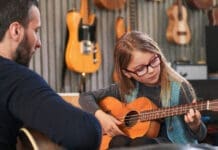Recitals are an important part of any music student’s education. These performances offer significant opportunities for growth and development. For students, the chance to perform in front of an audience can be both exhilarating and challenging. Yet, the benefits extend beyond stepping on stage. From technical skills to fostering emotional resilience, recitals provide valuable experiences that shape a music student’s journey.
- Building Confidence and Overcoming Stage Fright
One of the benefits of performing in a recital is the opportunity to build self-confidence. The idea of playing in front of others can be daunting. However, with practice and repeated exposure, the fear of performing gradually diminishes. Over time, students become more comfortable with public performance, gaining self-assurance to play before others. It is an excellent way to conquer stage fright and gain personal confidence.
- Refining Technical Skills
A recital performance offers students a chance to put their technical skills to the test. Rehearsing for a recital encourages musicians to fine-tune their playing, ensuring they achieve the highest level of precision in their technique. In preparing for recitals, students focus on details and often improve their overall musicianship as they perfect their instrument handling, rhythm, and phrasing.
- Developing Discipline and Time Management
Preparing for a recital requires a level of discipline and time management that is crucial to a student’s musical development. Students must organize their schedules to allow ample time for rehearsals, adjustments, and refinement of their songs. This process teaches valuable lessons in discipline as they balance their musical goals with other academic or personal commitments. The experience of preparing for a recital, then, is not only about musical growth but also about developing the habits of consistency and perseverance that will serve them in all areas of life.

- Enhancing Emotional Expression
One of the most rewarding aspects of performing in a recital is the ability to communicate emotion through music. Music is a powerful tool for expression, and recitals provide the opportunity to convey emotions to an audience. Whether playing a piece filled with joy, sorrow, or contemplation, students learn to use their instruments to evoke a particular mood or atmosphere. This emotional connection with the music develops one’s appreciation for their craft while honing their ability to connect with listeners on a deeper level.
- Receiving Constructive Feedback
Performing in front of an audience, including instructors and peers, provides students with the opportunity to receive constructive feedback. Teachers and fellow musicians might offer suggestions to help refine the performance. This feedback, while sometimes challenging, is crucial for a student’s growth. By learning how to welcome and implement constructive critique, students develop a sense of humility and strength to continue learning and improving.
- Cultivating a Sense of Community
Finally, recitals foster a sense of community among music students. These performances create a shared experience between the performer and the audience. The support from peers, family, and friends who attend the recital creates an encouraging atmosphere that nurtures the student’s growth. Also, they often provide students with the opportunity to connect with other musicians, exchange experiences, and learn from one another. The skills and experiences gained will influence their musical journey for years to come.
Studio 237 Music Lessons’ student recital is scheduled for May 10, Saturday, at Seagrove Baptist Church, 4915 E County Hwy 30A, Santa Rosa Beach, FL. The community Is invited to attend. Performance groups will begin at 10 a.m. and 1:30 p.m. Students of all ages and levels will be playing on piano, voice, guitar, drums, and ukulele. To find out more about Studio 237 visit our website at www.Studio237Music.com, and/or call (850) 231-3199.
























































